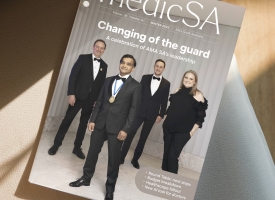Confusion over satellite hospital services
The numbers of patients presenting at satellite hospitals when they need an ambulance or emergency department is increasing, highlighting the confusion around the term 'hospital', AMA Queensland President Dr Nick Yim has told ABC Brisbane. "If people are presenting to the wrong location, that can lead to a lot of distress to the patient, their families, and it puts the workforce in those facilities under additional pressures."

Transcript: AMA Queensland President, Dr Nick Yim, ABC Radio Brisbane, Breakfast with Craig Zonca and Loretta Ryan, Monday 12 August 2024
Subject: Satellite hospital confusion
LORETTA RYAN: Do you know the difference between an urgent care clinic, a satellite hospital and a GP clinic? AMA Queensland is calling for clearer messaging around these facilities. Why is that? Dr Nick Yim is the Australian Medical Association Queensland President and joins us now. Good morning, Nick. What messaging do you want? What's the problem here?
DR NICK YIM: The key issue is that we are seeing an increasing number of unwell patients presenting to satellite hospitals - essentially a location that doesn’t have the capabilities to treat them. So what that means is that individual patient is delaying their treatment. Sometimes they need to be transferred to an emergency department or a tertiary hospital, and that delays treatment, and that utilises resourcing such as ambulances to transport them. What we need to do is have a new education campaign because it is quite confusing. As you've mentioned, we've got urgent care clinics, in October we'll have nurse-led clinics, and now we have these satellite hospitals.
LORETTA RYAN: Are you seeing this problem happening a lot?
DR NICK YIM: The numbers are showing a slight increase and we do want to ensure that the patient is treated in the most safe manner, because if people are presenting to the wrong location, that can lead to a lot of distress to the patient, their families, and it puts the workforce in those facilities under additional pressures.
LORETTA RYAN: So do you believe then these clinics are helping or hindering the system?
DR NICK YIM: I think there is a challenge. The community and the public, with the term ‘hospital’, there is an expectation that they have a full suite of services. The general public, they're not health professionals, they're not doctors. So when we go to a location that is termed hospital, people expect there should be the full suite of services, they have beds available, they have their specialists etc. We do need that communication to the public. Or alternatively, we might need to consider changing that name hospital.
LORETTA RYAN: To what, sorry?
DR NICK YIM: To change the name satellite hospital to something else that isn't representative of a hospital.
LORETTA RYAN: So what would that be?
DR NICK YIM: It could be something like clinic. It could be outpatients. It could be a centre, something like that where people aren't confused.
LORETTA RYAN: So, Nick Yim, tell us then, if people are confused and they don't know whether to take themself off to emergency or where to go, what's your advice?
DR NICK YIM: The key thing is if people are unwell, most people know their bodies reasonably well, but they aren't doctors. The GP is an area where they have their full records. They know their patient very, very well with their medical history. So the first point of contact, generally what we recommend is their general practitioner. Otherwise, if people are unwell with, say, chest pain, with signs of stroke, or they feel that they need a hospital where they need to stay, they probably should be presenting to the emergency department.
LORETTA RYAN: Okay. When do they go to the satellite hospital?
DR NICK YIM: So currently they do need to research what is available at each satellite hospital. We know that there are minor injury clinics for the relatively simple minor issues. Some satellite hospitals do have outpatient services, so they might have appointment-based services, but it's variable depending on each hospital. That information is online. But I appreciate when people are unwell, they just don't have the time to go online searching for what each satellite hospital has.
LORETTA RYAN: So at the moment, what are you calling on both the federal and state government health departments to do?
DR NICK YIM: The key message here, and we've been calling for this for years, is that there's been a gross underinvestment into general practice. We know that if each patient, each community, has a GP, we know that they know their patients well, the best, and they can treat many of these issues. These urgent care clinics, these nurse-led clinics, these satellite hospitals, they are stretching the workforce. And the community, unfortunately, is confused with where to present with these issues.
LORETTA RYAN: On the text line, Peter from Carseldine says maybe they should be named ‘health hubs’. It sort of doesn't explain what's going on there. Health hubs. I'm sick. I've broken my arm. I've done whatever. What should I do? Go to a health hub? Go to emergency? So that's the confusion, isn't it?
DR NICK YIM: Absolutely. And it's something where I know sometimes as a doctor, I'm not too sure where the individual can present. We don't know what each individual service can offer. It's something where we are working with the government to develop the appropriate messaging for our community. So this is a credit to them. They are working with us and we'd like to continue working with them.
LORETTA RYAN: Okay. Dr Nick Yim, thanks so much for talking to us.



